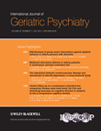Evaluation of Qualidem: a dementia-specific quality of life instrument for persons with dementia in residential settings; scalability and reliability of subscales in four Dutch field surveys
Abstract
Objective
To evaluate the scalability and reliability of Qualidem, a quality of life observation instrument rated by professional caregivers of persons with mild to very severe dementia living in residential settings.
Method
Data from four field surveys in the Netherlands were used. The instrument consists of nine subscales for mild to severe dementia; of which six can be applied in very severe dementia. The Mokken scaling model was used to compute scalability and reliability coefficients for each subscale and dementia group.
Results
Seven hundred fifty nine persons with mild to severe dementia and 214 persons with very severe dementia residing in 36 nursing homes and 4 homes for the elderly were included. In general, the subscales for the mild to severely demented group were scalable and (moderate) sufficiently reliable; the results confirmed the results of previous research to develop Qualidem. For the very severe demented group, four out of six subscales were scalable (Care relationship, H = 0.56; Positive affect, H = 0.55; Restless tense behavior, H = 0.42; and Social isolation, H = 0.34); they were also sufficiently reliable to measure quality of life (0.57 ≤ ρ ≤ 0.82). From the other two measured subscales, Social relations was considered not scalable (H = 0.26) and Negative affect was scalable (H = 0.36), but insufficiently reliable (ρ = 0.40).
Conclusion
Qualidem is an easy to administer and overall moderately sufficient reliable rating scale that provides a quality of life profile of persons with mild to even very severe dementia living in residential settings. Copyright © 2010 John Wiley & Sons, Ltd.




